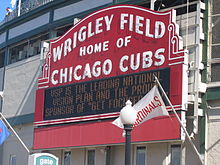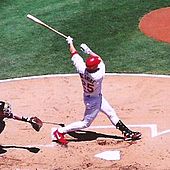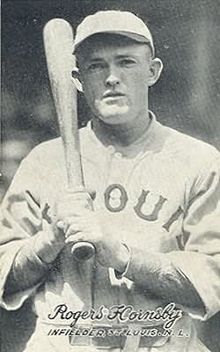- Cardinals–Cubs rivalry
-
St. Louis Cardinals – Chicago Cubs 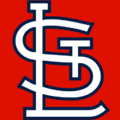
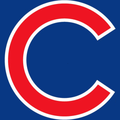
History First meeting October 14, 1885 Last meeting September 25, 2011 Next meeting April 13, 2012 Number of meetings 2,167 Regular season series 1,096-1,054-17, Cubs[1] Largest victory Current streak Longest Cardinals win streak Longest Cubs win streak The Cardinals–Cubs rivalry refers to the rivalry between the St. Louis Cardinals and the Chicago Cubs of the National League in Major League Baseball. The rivalry is also known as the I-55 Series (or in earlier years the Route 66 Series), deriving its name from the roadway connecting the two cities, Interstate 55 (which itself succeeded the famous U.S. Route 66). The Cubs lead the series 1,092–1,049 through 2011, while the Cardinals lead in National League pennants with 18 against the Cubs' 16. However, the Cardinals have a clear edge when it comes to World Series successes, having won 11 championships to the Cubs' 2. Cardinals-Cubs games see numerous visiting fans in either St. Louis' Busch Stadium or Chicago's Wrigley Field. When the National League split into two, and then three divisions, the Cardinals and Cubs remained together. This has added excitement to several pennant races over the years, most recently in 1989 and 2003.
Contents
History
In his book, Before They Were Cardinals, Jon David Cash speculates that the economic trade rivalry between the cities of Chicago and St. Louis led to the formation of the St. Louis Brown Stockings in 1875 to compete with the Chicago White Stockings.[2][3] The Brown Stockings would later fold and reemerge in the 1880s when the Cardinals (as the Browns), met the Cubs (as the White Stockings), in a pair of pre-World Series matchups between American Association champion St. Louis and National League champion Chicago. The first series played in 1885 ended in dispute with no winner. The next year St. Louis won the matchup.
In recent years, tragedies in the Cardinals organization have caused two games between these teams to be postponed. In 2002, after Cardinals pitcher Darryl Kile was found dead in a Chicago hotel room, a game between the teams in Wrigley Field was postponed.[4][5] Then in 2007, another Cardinals pitcher, Josh Hancock, was killed in a car crash while driving intoxicated, causing a game in St. Louis to be postponed.[6][7] Incidentally, both games were scheduled to air on one of MLB's major broadcast partners—the 2002 game was to air on Fox, and the 2007 game was planned for ESPN Sunday Night Baseball.
Former Cubs shortstop Ryan Theriot, who was acquired by the Cardinals from the Los Angeles Dodgers on November 30, 2010, told a St. Louis radio station that he was "finally on the right side of the Cardinals-Cubs rivalry" and that he was happy to be with an organization that emphasized winning World Series championships instead of being "an afterthought". Cubs pitcher Carlos Zambrano called him "the enemy now."[8]
Territorial rights
In his book Three Nights in August, Buzz Bissinger compared the Cardinals-Cubs rivalry to another famous rivalry in American baseball: "The Red Sox and Yankees is a tabloid-filled soap opera about money and ego and sound bites. But the Cubs and Cardinals are about... geography and territorial rights."[9]
One of the "territories" in question is central Illinois, which receives both radio broadcasts of Cardinals games (on KMOX, re-starting in 2011, and previously for decades until for the 2006 season, when the Cardinals' owners moved the broadcasts to KTRS, a station they bought for the purpose) as well as WGN radio & WGN television, including WGN-TV's superstation) broadcasts of Cubs games. Both KMOX and WGN radio are traditional "clear channel" AM radio stations, and both teams fought for fans in the Western states prior to Major League expansion. Also prior to Major League expansion, the Cardinals traditionally claimed huge parts of the Lower Midwest and the South in their territory, while the Cubs claimed the Upper Midwest.
Loyalties to the two teams divided friends, families, and co-workers, and shaped the locals in various ways, as George Will noted in a 1998 commencement address at Washington University in St. Louis: "I grew up in Champaign, Illinois, midway between Chicago and St. Louis. At an age too tender for life-shaping decisions, I made one. While all my friends were becoming Cardinals fans, I became a Cub fan. My friends, happily rooting for Stan Musial, Red Schoendienst, and other great Redbirds, grew up cheerfully convinced that the world is a benign place, so of course, they became liberals. Rooting for the Cubs in the late 1940s and early 1950s, I became gloomy, pessimistic, morose, dyspeptic and conservative. It helped out of course that the Cubs last won the World Series in 1908, which is two years before Mark Twain and Tolstoy died. But that means, class of 1998, that the Cubs are in the 89th year of their rebuilding effort, and remember, any team can have a bad moment."[10]
Notable personalities
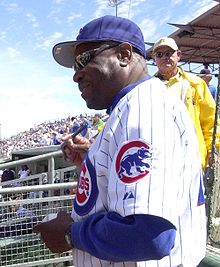 Dusty Baker, manager of the Chicago Cubs (2003-2006)
Dusty Baker, manager of the Chicago Cubs (2003-2006)
Many players have played for both teams, including Hall of Famer Rogers Hornsby, who holds several single season hitting records for both clubs. Notably, Hall of Famer Lou Brock was traded from the Cubs to the Cards early in his career for pitcher Ernie Broglio. This is widely considered one of the most one-sided trades in baseball history. Other Hall of Famers who played/managed with both clubs include Grover Cleveland Alexander, Clark Griffith, Burleigh Grimes, Bruce Sutter, Roger Bresnahan, Dizzy Dean, Dennis Eckersley, Rabbit Maranville, Hoyt Wilhelm, and Leo Durocher.
Legendary announcer Harry Caray began his career in St. Louis, broadcasting on KMOX radio for 24 seasons, before moving to Chicago in 1971 and becoming a staple of WGN radio and television broadcasts from 1982 until his death before the 1998 season.
The rivalry between the two clubs intensified following the hiring of Dusty Baker to manage the Cubs following the 2002 season. In 2002, when Baker was managing the San Francisco Giants, he and Cardinals manager Tony La Russa had run-ins during that year's National League Championship Series, with the animosity carrying over to Baker's tenure with the Cubs. According to Baker, part of the intensity stems from the close relationship of the two. "It's very intense...When you play 18 times against a team that's had a long-time rivalry, and my former manager and my former confidant, that just increases things."[11] Baker played for La Russa in 1986 as a member of the Oakland Athletics.
Some say that the feud between the two managers have added to the rivalry between the two teams. "Both managers are fiercely protective of their players. Both believe in old-school baseball protocol. Neither will sit by idly and watch an opponent show up their team. Both are fierce competitors with enormous pride…. Fans don’t usually buy tickets to watch managers manage . . . but this tactical showdown added something to the Cubs-Cards series."[12]
After the Cubs fired Dusty Baker in 2006, the rivalry was raised by another notch as they replaced him with Lou Piniella. Coincidentally, Piniella and La Russa both grew up in Tampa and faced each other in the 1990 World Series as managers of the Cincinnati Reds and Oakland Athletics, respectively.
McGwire/Sosa home run chase
Main article: 1998 Major League Baseball home run record chaseIn 1998, the teams were connected by the Mark McGwire-Sammy Sosa home run race, credited by many with revitalizing the sport following the players' strike which cancelled the 1994 World Series and the first part of the 1995 season.[13][14][15]
In early September the teams met for a two-game series at Busch Memorial Stadium in St. Louis. In the first game, McGwire hit his record-tying 61st home run off pitcher Mike Morgan in the first inning as part of a 3-2 Cardinals victory. The following day, McGwire broke the record with #62 off Steve Trachsel in the fourth inning as part of a 6-3 victory against the Cubs. In a show of sportsmanship, Sammy Sosa was there to embrace and congratulate his home run rival and on-field opponent after McGwire rounded the bases. McGwire would finish the year with 70 home runs and Sosa with 66. However, the Cubs won the National League wild card, making the playoffs for the first time in nine years, while the Cardinals finished barely above .500. Sosa eventually became the NL MVP that season, even though Mark McGwire finished with 4 more home runs.
Sosa dedicated each of his 66 home runs that season to the memory of Cubs broadcaster Harry Caray, who died in February that year.[16]
After the chase
A somber showing of acknowledgment between the two teams happened in 2002 when Cubs catcher Joe Girardi addressed the fans at Wrigley Field in a choked up way that the game between the two teams had been cancelled and that the fans should pray for the St. Louis Cardinals family.[4] However, there were fans who booed.[4][17] Later, a press conference was held where an emotional Girardi addressed the death of Cardinals pitcher Darryl Kile. Girardi, who played for both the Cubs and the Cardinals, addressed the fans in a regional broadcast on Fox.[4]
In 2005, the Cardinals and Cubs renewed their rivalry when first basemen Derrek Lee for the Cubs and Albert Pujols for the Cardinals were locked in an MVP race. Nabbing the NL batting title, Lee led the league in hits and batting average and bested Pujols in home runs. For his part, Pujols led the league in runs scored and had the edge on Lee in RBIs. Lee was awarded both the Gold Glove and Silver Slugger as the best NL first baseman on both defense and offense, respectively. However, with the Cardinals winning 100 games and the division and the Cubs finishing 21 games back in fourth place, Pujols took home the National League MVP honors.
Statistical comparison
As of the end of the 2011 MLB Season
Championships and playoff appearances
Category Cardinals Cubs World Series championships 11 2 League pennants 18 16 Division championships 11[18] 5 Wild Card berths 2 1 Major award winners
As of the end of the 2009 MLB Season
Category Cardinals Cubs MVP 20 10 Cy Young 3 4 Rookie of the Year 6 4 Manager of the Year 2 4 Gold Glove winners
As of the end of the 2010 MLB Season
Category Cardinals Cubs Pitcher 14 7 Catcher 10 2 First Base 14 6 Second Base 2 11 Third Base 12 5 Shortstop 14 3 Outfield 16 3 Silver Slugger winners
As of the end of the 2009 MLB Season
Category Cardinals Cubs Pitcher 3 3 Catcher 1 1 First Base 8 1 Second Base 0 7 Third Base 2 0 Shortstop 5 0 Outfield 6 8 Single season records
As of 10/4/2009
Category Cardinals Cubs Home runs Mark McGwire, 70 (1998) Sammy Sosa, 66 (1998) Runs batted in Joe Medwick, 154 (1937) Hack Wilson, 191 (1930) (MLB record) Batting average Rogers Hornsby, .424 (1924) Bill Lange, .389 (1895) Hits Rogers Hornsby, 250 (1922) Rogers Hornsby, 229 (1929) Runs Rogers Hornsby, 141 (1922) Rogers Hornsby, 156 (1929) Doubles Joe Medwick, 64 (1936) Billy Herman, 57 (1935 & 1936) Triples Tom Long, 25 (1915) Vic Saier and Frank Schulte, 21 (1913 & 1911) Extra Base Hits Stan Musial, 103 (1948) Sammy Sosa, 103 (2001) Grand Slams Albert Pujols, 5 (2009) Ernie Banks, 5 (1955) On-Base Percentage Rogers Hornsby, .507 (1924) King Kelly, .483 (1886) Slugging Percentage Rogers Hornsby, .756 (1925) Sammy Sosa, .737 (2001) Stolen bases Lou Brock, 118 (1974) Bill Lange, 84 (1896) Hitting streak Rogers Hornsby, 33 games (1922) Bill Dahlen, 42 games (1894) Strikeouts Jim Edmonds, 167 (2000) Sammy Sosa, 174 (1997) Walks Mark McGwire, 162 (1998) Jimmy Sheckard, 147 (1911) Pitching wins Dizzy Dean 30, (1934) John Clarkson, 53 (1885) Pitching strikeouts Bob Gibson, 274 (1970) Bill Hutchinson, 314 (1892) Pitching ERA Bob Gibson, 1.12 (1968) Mordecai Brown, 1.04 (1906) Pitching Saves Lee Smith, 47 (1991) Randy Myers, 53 (1993) Hall of Fame plaques with team logo
Cardinals - (11)
- Lou Brock (1985)
- Rogers Hornsby (1947)
- Dizzy Dean (1953)
- Bob Gibson (1981)
- Stan Musial (1969)
- Red Schoendienst (1989)
- Enos Slaughter (1985)
- Ozzie Smith (2002)
- Bruce Sutter (2006)
- Billy Southworth (2008)
- Whitey Herzog (2010)
Cubs - (9)
- Ernie Banks (1977)
- Frank Chance (1946)
- Kiki Cuyler (1968)
- Gabby Hartnett (1955)
- Billy Herman (1975)
- Ferguson Jenkins (1991)
- Ryne Sandberg (2005)
- Billy Williams (1987)
- Hack Wilson (1979)
The Cubs Is Dead
The rivalry has now entered cyberspace in the form of a threaded discussion on the St. Louis Cardinals' message board entitled, "The Cubs Is Dead". The title of the thread stems from a comment made by Brooklyn Dodgers' manager Charlie Dressen regarding the pennant chances of the New York Giants on August 10, 1951. He said: "The Giants is Dead".
Though, sometimes, the posts exchanged back and forth between Cardinal fans and Cub fans can be quite vicious, most of them are made in good-natured fun. An earlier version of the thread was started by a Cardinals' fan using the screen name rexbird10 in 2005, but has since been deleted. The current version, also started by rexbird10, was started on July 20, 2008 and, as of December 29, 2010, has had over 5000 responses.[19] Similar versions of the thread have been started on the message boards of other major league teams, most notably the Chicago White Sox and the Houston Astros.
See also
References
- Inline citations
- ^ Head-to-Head Records for St. Louis Cardinals against the listed opponents from 1901 to 2011
- ^ Cash, Jon David (2002). Before They Were Cardinals: Major League Baseball in Nineteenth-Century St. Louis. University of Missouri Press.
- ^ Baseball - Greatest Rivalry In Baseball
- ^ a b c d Greenstein, Teddy (June 23, 2002). "MacPhail wanted vague notice; Cubs exec sought to protect Kile family members". Chicago Tribune: p. 5.
- ^ Newhan, Ross (June 23, 2002). "Kile's Death Stuns Baseball; Cardinals: St. Louis pitcher, 33, is found in his Chicago hotel room and appears to have died of natural causes. Game against Cubs is canceled". Los Angeles Times: p. D1.
- ^ Sullivan, Paul (April 30, 2007). "Cards lose a 'great teammate, friend'; Pitcher Hancock killed in car crash; Cubs game called off". Chicago Tribune: p. 1.
- ^ Shaikin, Bill (April 30, 2007). "Cardinals' Hancock dies in car accident". Los Angeles Times: p. D1.
- ^ Goold, Derrick (January 19, 2011). "Theriot ready to play on right side of the rivalry". St. Louis Post-Dispatch. http://www.stltoday.com/sports/baseball/professional/article_18a52492-0736-5b28-a98d-948fd6ef9371.html?print=1.
- ^ Bissinger, Buzz (2005). Three Nights in August: Strategy, Heartbreak and Joy Inside the Mind of a Manager. Houghton Mifflin Company.
- ^ George Will - Baseball
- ^ Muskat, Carrie (April 7, 1986). "Notes: Skippers intensify rivalry". MLB.com. http://mlb.mlb.com/NASApp/mlb/news/article.jsp?ymd=20060407&content_id=1388290&vkey=news_chc&fext=.jsp&c_id=chc.
- ^ Gordon, Jeff (May 15, 2006). "Ottawa mayor looks sharper than Senators did vs. Sabres". St. Louis Post Dispatch: p. D2.
- ^ Muskat, Carrie (August 8, 2002). "The Sosa-McGwire home run race". MLB.com. http://mlb.mlb.com/news/article.jsp?ymd=20020808&content_id=99342&vkey=news_mlb&fext=.jsp&c_id=null. Retrieved 2009-10-12.
- ^ Bodley, Hal (March 17, 2006). "Baseball's steroids issue remains in the news". USA Today. http://www.usatoday.com/sports/baseball/columnist/bodley/2006-03-16-bodley-steroids_x.htm.
- ^ Leonhardt, David (March 30, 2005). "Myth of men who saved baseball". New York Times. http://www.nytimes.com/2005/03/29/sports/29iht-fans.html?_r=1&pagewanted=print.
- ^ Dedman, Bill (September 29, 1998). "Unlikely Season Of Dreams For Cubs". The New York Times: p. D3. "Since Caray died at the start of spring training, Sosa has honored him with a 'V' sign after every home run this season, along with his heart thumps and kisses for the Sosa family."
- ^ Beatriz, Ana; Avila, Oscar (June 23, 2002). "It's `a time to put this rivalry away'". Chicago Tribune: p. 3.
- ^ includes 1981 'split season' with best overall record but not winning either half
- ^ http://forums.prospero.com/n/pfx/forum.aspx?tsn=1&nav=messages&webtag=ml-cardinals&tid=88167
- Bibliography
St. Louis Cardinals Based in St. Louis, Missouri Franchise History · Seasons · Records · No-hitters · Awards & League Leaders · Roster · Players · Managers · General Managers and Owners · Broadcasters · Opening Day starting pitchers · First-round draft picks · All articlesBallparks Robison Field · Sportsman's Park · Busch Memorial Stadium · Busch Stadium
Spring Training: McKechnie Field · City Island Ball Park · Al Lang Stadium · Roger Dean StadiumCulture Cardinal Nation · Fredbird · Gashouse Gang · KMOX · Rally Squirrel · Seat Cushion Night · WhiteyballLore Rivalries Chicago CubsRetired numbers Key personnel Minors AAA: Memphis Redbirds AA: Springfield Cardinals A: (high) Palm Beach Cardinals · (low) Quad Cities River Bandits · (short-season) Batavia Muckdogs Rookie: Johnson City Cardinals · Gulf Coast League Cardinals · Dominican Summer CardinalsWorld Series
ChampionshipsLeague pennants Division titles Wild card titles 2001 · 2011Seasons (131) 1880s-1890s 1900s-1910s 1920s-1930s 1940s-1950s 1960s-1970s 1980s-1990s 2000s-2010s Major League Baseball rivalries American League National League NL EastNL CentralCardinals–Cubs · Brewers–CubsNL WestInterleague Angels–Dodgers · Orioles–Nationals · Athletics–Giants · Rays–Marlins · Rangers–Astros · Indians–Reds · White Sox – CubsRelated articlesHistorical
Wikimedia Foundation. 2010.

